Adjustment Refusal Letter
Dear [Recipient's Name],
I hope this letter finds you well. I am writing to express my sincerest gratitude for the opportunity to [request/apply] for [specify the adjustment or request]. I appreciate the time and consideration that you and the [Company/Organization Name] have given to my [request/application].
However, after careful consideration and evaluation, I regret to inform you that I must decline the adjustment that has been proposed. While I recognize the importance and value of the adjustment, I have carefully reviewed my current situation and circumstances, and I believe that it is in my best interest to continue with the existing arrangements.
Please understand that this decision was not made lightly. I have taken into account various factors, including my personal and professional goals, as well as the potential impact on the team and the organization as a whole. I believe that by declining the adjustment, I can continue to contribute effectively and focus on my current responsibilities.
I would like to emphasize that my decision should not be seen as a lack of appreciation for the opportunity or the value of the adjustment. I genuinely value my position within the [Company/Organization Name] and the trust that has been placed in me. I am committed to giving my utmost dedication and effort to fulfill my current role and contribute to the success of the team.
Once again, I want to express my gratitude for considering my request and for the support and understanding that you have shown throughout this process. I am confident that the [Company/Organization Name] will continue to thrive and succeed, and I am proud to be a part of this organization.
If there are any further discussions or alternative options that you would like to explore, I am open to a conversation. I believe in open communication and collaboration, and I am willing to discuss any concerns or ideas you may have.
Thank you once again for your understanding. I look forward to continuing to contribute to the [Company/Organization Name] in my current capacity. Please feel free to reach out to me if there are any additional matters you would like to discuss.
Yours sincerely,
[Your Name]
Professional Adjustment Refusal Letter
Subject: Response to Your Adjustment Request
Dear [Recipient Name],
We acknowledge receipt of your request for adjustment regarding [specific issue]. After thorough review, we regret to inform you that we are unable to approve your request due to [specific reason].
We appreciate your understanding in this matter. Please feel free to contact us for any clarification.
Sincerely,
[Your Name]
[Position]
[Company Name]
Customer Service Adjustment Refusal Email
Subject: Your Request for Adjustment
Hi [Recipient Name],
Thank you for contacting us regarding [issue]. We have carefully reviewed your request; however, we are unable to provide the requested adjustment at this time due to [reason].
We value your relationship with us and are happy to assist with any alternative solutions.
Best regards,
[Your Name]
[Position]
Formal Letter Declining Billing Adjustment
Subject: Billing Adjustment Request Declined
Dear [Recipient Name],
We have received your request for a billing adjustment on [account/invoice number]. After evaluating the details, we regret to inform you that your request cannot be accommodated under our company policies.
Thank you for your understanding.
Sincerely,
[Your Name]
[Position]
[Company Name]
Informal Adjustment Refusal Message
Subject: Adjustment Request Update
Hi [Recipient Name],
I reviewed your adjustment request regarding [issue]. Unfortunately, we won’t be able to approve it due to [reason].
Let’s discuss alternatives if needed.
Thanks,
[Your Name]
Provisional Adjustment Refusal Letter
Subject: Preliminary Response to Adjustment Request
Dear [Recipient Name],
We have received your adjustment request concerning [specific issue]. At this stage, we are unable to grant the adjustment. Please note that this is a provisional decision, subject to further review if additional information is provided.
Thank you for your cooperation.
Best regards,
[Your Name]
Creative Polite Refusal Letter
Subject: Regarding Your Adjustment Request
Dear [Recipient Name],
We appreciate you taking the time to submit a request for adjustment related to [specific issue]. While we understand your concerns, we are unable to make the requested adjustment due to [reason].
We value your engagement and hope to continue working together positively.
Warm regards,
[Your Name]
What is an Adjustment Refusal Letter and Why Is It Important?
An adjustment refusal letter is a formal communication used to decline a request for modifications, corrections, or changes, typically in billing, accounts, services, or other formal agreements.
Its purpose is to clearly communicate the denial, maintain professional relationships, and provide justification for the refusal.
Who Should Send an Adjustment Refusal Letter?
- Company managers or supervisors responsible for the decision.
- Customer service representatives with authority to respond to requests.
- Billing or finance department personnel for invoice-related refusals.
- Human resources for employee-related adjustment denials.
Whom Should an Adjustment Refusal Letter Be Addressed To?
- Clients or customers requesting adjustments.
- Internal staff seeking exceptions or modifications.
- Vendors or partners requesting changes.
- Regulatory or external parties when official refusal is necessary.
When Should an Adjustment Refusal Letter Be Sent?
- Immediately after reviewing the request.
- After thorough evaluation of the circumstances and policies.
- When a request cannot be honored due to legal, financial, or operational constraints.
- As part of formal closure of an adjustment request process.
How to Write and Send an Adjustment Refusal Letter
- Start with a clear subject line reflecting the purpose.
- Address the recipient personally and politely.
- Acknowledge receipt of the adjustment request.
- State the refusal clearly, concisely, and professionally.
- Provide specific reasons for denial without excessive detail.
- Offer alternatives if possible or provide guidance for next steps.
- Close with courtesy and provide contact for follow-up if needed.
- Choose email for prompt communication or printed letter for formal acknowledgment.
Formatting Guidelines for Adjustment Refusal Letters
- Length: 2–3 concise paragraphs.
- Tone: Professional, polite, and firm.
- Style: Formal for official communication; informal for internal teams.
- Include reason for refusal and acknowledgment of the request.
- Ensure correct grammar, spelling, and proper signature or sender identification.
After Sending an Adjustment Refusal Letter
- Record the communication for company or legal records.
- Follow up if the recipient requests clarification.
- Be prepared to provide alternative solutions if applicable.
- Monitor for any disputes or escalation that may require management involvement.
Common Mistakes to Avoid
- Using vague or unclear language in refusal.
- Being overly harsh or dismissive in tone.
- Delaying response to the adjustment request.
- Omitting essential details like the specific reason for denial.
- Failing to offer alternatives or guidance if appropriate.
Elements and Structure of an Adjustment Refusal Letter
- Subject line or heading clearly stating refusal.
- Greeting addressing the recipient.
- Introduction acknowledging receipt of the request.
- Main body explaining the refusal and reasons.
- Optional: suggestions or alternative solutions.
- Closing statement expressing appreciation for understanding.
- Signature with name, position, and date.
Tricks and Tips for Writing Effective Adjustment Refusal Letters
- Keep the tone professional and respectful.
- Provide a concise yet clear explanation for the refusal.
- Avoid overly negative or emotional language.
- Offer guidance or alternatives when feasible to maintain goodwill.
- Ensure timely delivery to prevent misunderstandings or dissatisfaction.
FAQ: Frequently Asked Questions About Adjustment Refusal Letters
Q: Should reasons for refusal always be included?
A: Yes, providing a clear reason maintains transparency and professionalism.
Q: Can an adjustment refusal letter be sent via email?
A: Yes, email is acceptable, especially for faster communication; printed letters are preferred for formal or official cases.
Q: Is it necessary to offer alternatives?
A: Optional, but suggesting alternatives helps maintain a positive relationship.
Q: How soon should the refusal letter be sent?
A: Immediately after a decision is made, to avoid confusion or frustration.
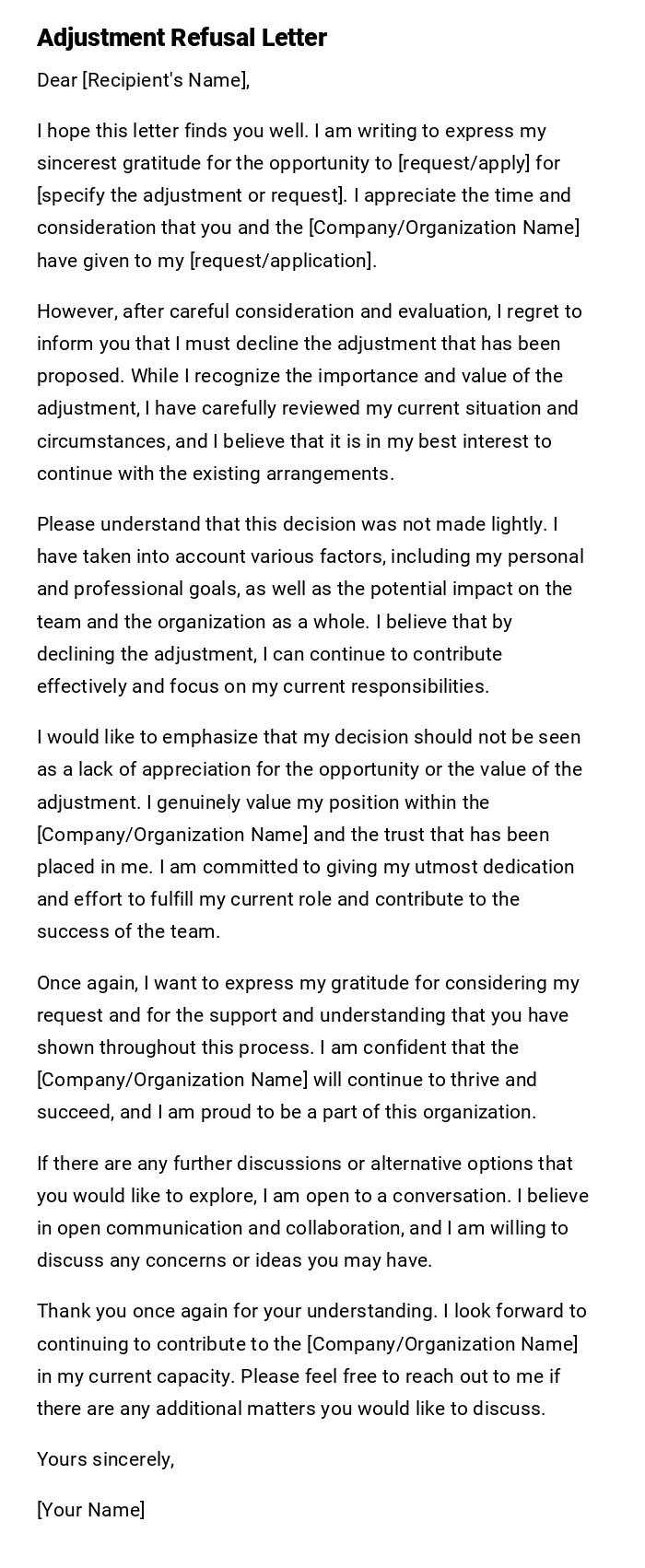
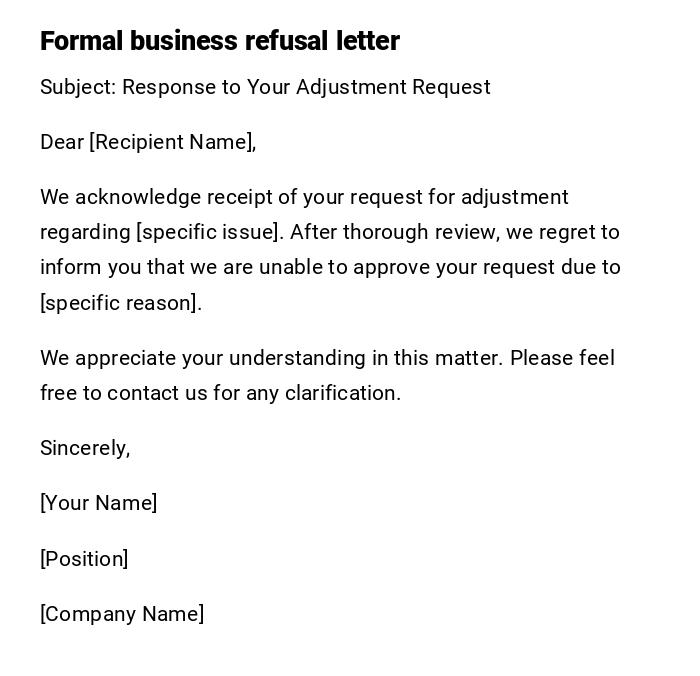
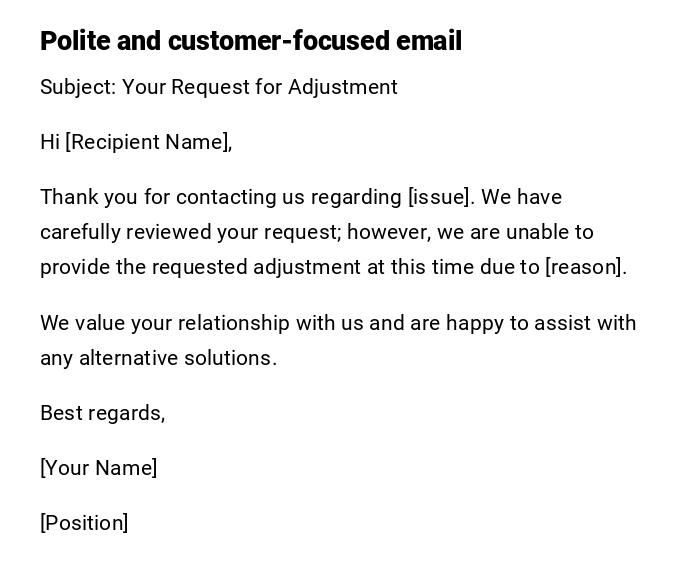
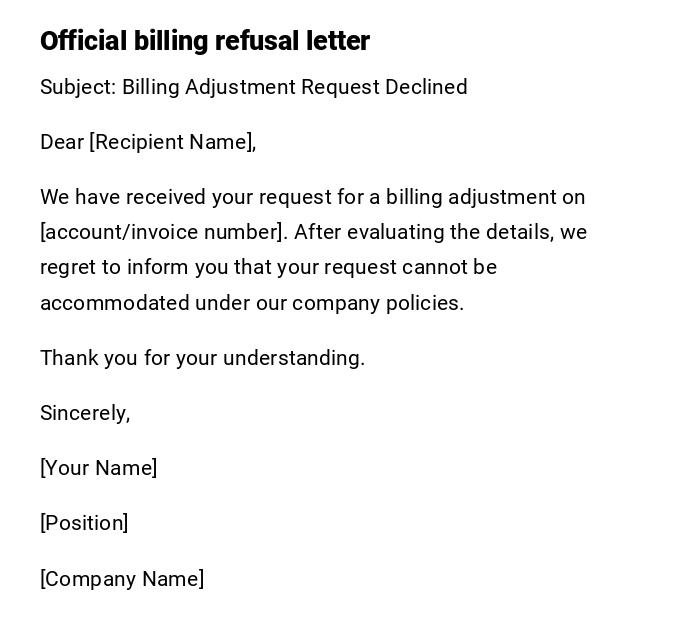
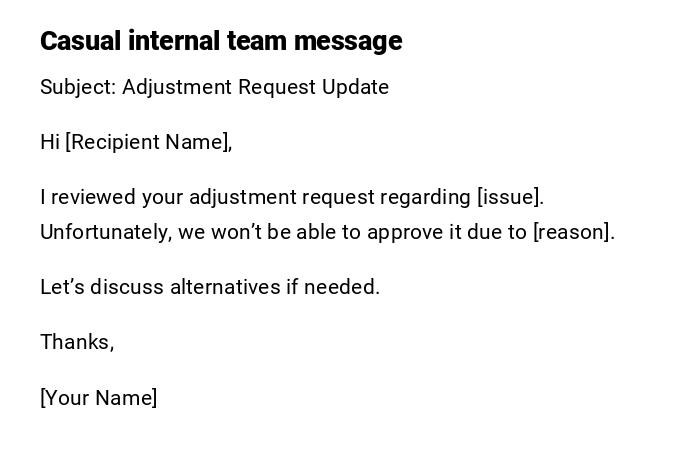
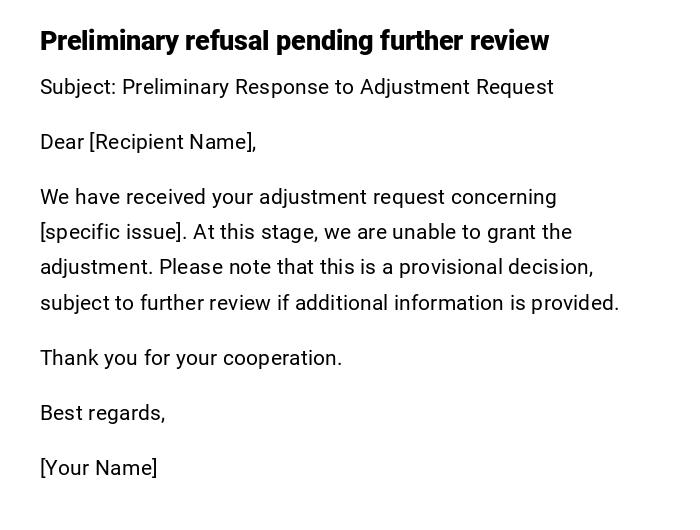
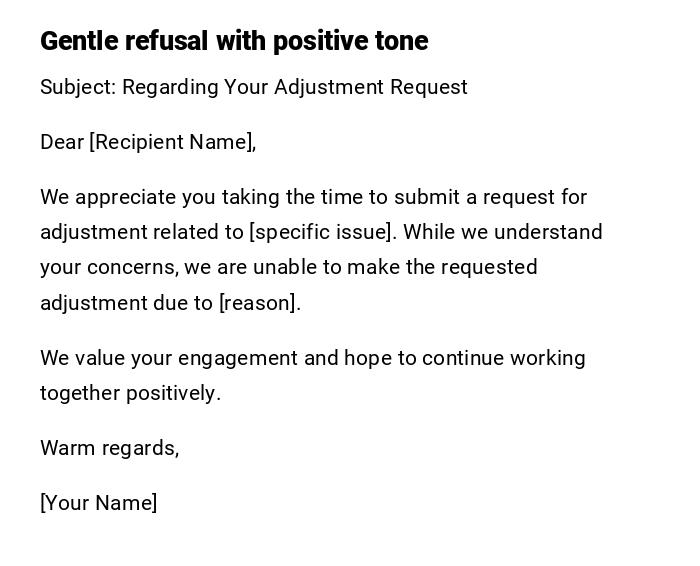

 Download Word Doc
Download Word Doc
 Download PDF
Download PDF